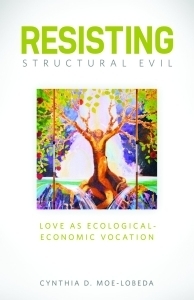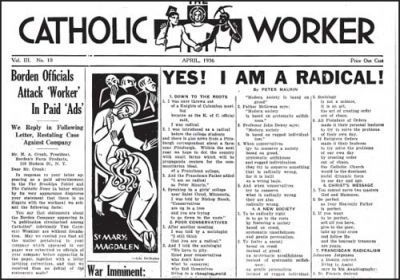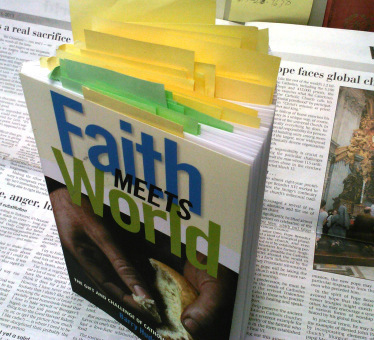Barry Hudock's Blog, page 30
May 8, 2013
An evening at the Catholic Worker
Stearns County folks: The Central Minnesota Catholic Worker is hosting me for a discussion on Catholic social teaching and my new book, Faith Meets World, at the CW house in St. Joseph, MN, on Monday, May 13. We’ll start with a simple meal at 6:30 pm, followed by the discussion around 7:15. The evening will also include prayer and book signing.
The house is at 35 2nd Ave SE. All are welcome.


May 6, 2013
Do we WANT the honeymoon to end?
This troubles me. “The honeymoon (that the media is having with the Pope) will end,” say the ‘conservatives.’ (Another version of this is that “the liberals will soon turn on him!”)
But they don’t just say it; they almost insist on it, seem to wish for it and place their fervent hope in it. They say it with gritted teeth, willing it to be so. They say it almost with resentment that it has not happened yet. “Make no mistake about it,” says one commenter to the Crisis article at the link, ”the press’ ‘turning on’ Pope Francis would be a good sign, a sign of hope and a cause for rejoicing.”
They may be right about the turning to come, of course. They probably are. It’s true, the media and much of western culture in our day have found a lot about Christian doctrine, but more particularly with some elements of Catholic morality, to be unhappy about. But what’s oddly missing is a sense of welcoming by these ‘conservatives’ of the fact that it hasn’t happened yet.
I mean, we do want the world to embrace the Gospel, right? That’s the goal, no? It’s what the New Evangelization is all about, unless I’m missing something. Wouldn’t that be “a sign of hope and cause for rejoicing”?? I get the impression that for some people, the New Evangelization means “They were ignoring the Church’s teaching before, so, by-God, we are going to make sure they can’t ignore it; in fact, we’re going to ram it down their damn throats.”
Of course, no one who does not perceive the deliverer of a message to be worth listening to, to be trusted to offer a message that is reliable, will ever hear the message. And so we want the world, the media, to be receptive to the Pope. For them to “love” him would be quite a good thing. And it would not necessarily mean that he’s failing to preach the Gospel.
Pope Francis surely is not. He has not – God bless him — hesitated to say things that are not palatable to many of us modern, secularized westerners. He’s been talking frequently about the devil, for one thing. He has rejected the idea of reading and interpreting Scripture too individualistically. He has criticized the “intellectuals without talent” and the “ethicists without goodness” who interpret Jesus as purely human rather than also divine. He has insisted that Jesus is “the only gate” for entering the kingdom of God” and that “to find Jesus outside of the Church is not possible.” He has taken jabs at the capitalism and the consumerism that is the very cultural air we breath. All that since his election in mid-March.
He has? So why haven’t they turned on him? Why haven’t they flippin’ tarred and feathered him?
Maybe we should ask ourselves whether the Church and its message have at times been harshly rejected not so much because of what we’ve said, but how we have said it. Maybe this fervent insistence that the honeymoon will end is simply a way to reassure ourselves that if our words have been rejected, it certainly is not because of anything about us or the way we’ve offered these words. Yet isn’t it possible that it has not been welcomed at times because we’re offering it in the form of a scold, a judgment, a condemnation, rather than as wonderful, beautiful Good News, news that we ourselves have been transformed by, and that we are therefore humbly sharing with our fellow wayfarers along the paths of life?
Maybe one thing that the new supreme teacher of the Church universal is teaching us is a few qualities of a great teacher of doctrine that we have forgotten: simple human warmth, humility, respectfulness, simplicity, clear attentiveness to the poor.
The honeymoon may indeed end. I’m hoping not too soon.


May 5, 2013
Resisting Structural Evil
 Leisure reading time has been in shorter supply for me this year than it has been in over a decade. For that reason, I’ve quit reading several books lately soon after beginning them; I don’t want to waste time reading something that I’m not enjoying. I mention that because there was never any question of dropping Cynthia D. Moe-Lobeda’s Resisting Structural Evil: Love as Ecological-Economic Vocation until the end. Stealing away small chunks of time in the evening, sometimes enjoying an hour or two on a weekend, I slowly worked my way through, and it was time well spent.
Leisure reading time has been in shorter supply for me this year than it has been in over a decade. For that reason, I’ve quit reading several books lately soon after beginning them; I don’t want to waste time reading something that I’m not enjoying. I mention that because there was never any question of dropping Cynthia D. Moe-Lobeda’s Resisting Structural Evil: Love as Ecological-Economic Vocation until the end. Stealing away small chunks of time in the evening, sometimes enjoying an hour or two on a weekend, I slowly worked my way through, and it was time well spent.
Moe-Lobeda offers a fascinating exploration of “the complex webs of exploitation enabling our extravagant acquisition and consumption … the intricate webs of interrelated power arrangements, ideologies, values, practices, policies, and ways of perceiving reality that span generations and have unintended snowballing consequences.” The unsettling message here is that we wealthy, over-consuming Americans do not have what we have simply because we are more fortunate or more resourceful or more blessed, but as a result of human choices and structures that obtained these “blessings” for us at least in part through systematic oppression of and robbing from others.
Others are poor because our economic systems make them poor, to defend and support our overconsumption. In the words of one Methodist bishop Moe-Lobeda quotes, “African children die so that North American children may overeat.”
No, we’re not all villainous plunderers — at least not consciously. Most of us participate in and/or benefit from the villainy with little awareness of it. We even ignore it, vaguely aware that it would break our hearts to know more, but thinking we may as well avoid knowing since there’s nothing we can do to change it. But Moe-Lobeda insists, we must make ourselves aware of it, not only because we’re involved in it, but because we can do something about it. “I cannot overstate the importance of recognizing this paradox,” she writes: “Structural sin, while it cannot be dismantled by individual actions, cannot be dismantled without them.”
One of the strong points of this book is that it is very specific and concrete. She offers a wide variety of things we can do, goals that can be attained, problems that can be addressed. She “names names” — not only the bad guys, but the good guys, too, the people and organizations who are already doing things to make the world better, whom we can get to know and with whom we can join forces (to name just a few: United Students against Sweatshops, the fair trade movement and even fair trade towns, Oxfam, 350.org, the Faith Action Network, Walmart Watch, and Food First). I found myself turning to the internet to find out more about activist organizations she features and issues she shines a light on. Of course, some will be more appealing than others to various people, but the point is, they’re out there and in many cases doing effective work.
Too often, we absolve ourselves by our gifts to charitable organizations that offer direct aid to those in need. And that is both good and quite essential. But it’s clear that it is not enough, and if it leaves us with the impression that we’ve done our part, it’s even dangerous. Moe-Lobeda writes:
Such charity is a strong and necessary response to God’s call to love neighbor as self. However, alone, it is NOT a turn away from — a renunciation of — structural sin. I may respond in charity to a homeless woman and continue to support and benefit materially from public policies and corporate actions that render her homeless. I may help pay for the injured child’s surgery [she refers here to a young Iraqi boy brought to the United States during the war in Iraq for reparative surgery after U.S. bombing wrecked his leg, which briefly garnered much attention and generated a lot of charitable donations] while still enjoying cheaper oil enabled by the Revenue Sharing Agreements with Iraq obtained in part through the American war on that country. I may rebuild houses in New Orleans and remain a beneficiary of the white privilege that made Katrina’s victims disproportionately Black.
Moe-Lobeda is not Catholic, but her work in this book bears much in common with teaching to be found in Pope Paul VI’s Populorum Progressio and Evangelii Nuntiandi, John Paul II’s Sollicitudo Rei Socialis and Reconciliatio et Paenitentia, and especially Benedict XVI’s Caritas in Veritate. She agrees wholeheartedly with Benedict’s insistence in the latter encyclical that “if we love others with charity, then first of all we are just towards them. Not only is justice not extraneous to charity, not only is it not an alternative or parallel path to charity: justice is inseparable from charity, and intrinsic to it. Justice is the primary way of charity.” In fact, the entire book could be taken as a detailed explanation of what Pope Benedict means when he calls structural reform “the institutional path — we might also all it the political path — of charity, no less excellent and effective than the kind of charity which encounters the neighbor directly” (CiV, sections 6 and 7).
A few criticisms, in fairness.
– There are places where I thought Moe-Lobeda too easily absolves the real people who are responsible for the unjust actions, structures, and processes she addresses. Within such structures, she says, “No specific person may be held responsible.” The evil is “not traceable to any one person.” It is “not a direct act by identifiable individuals.” But as she herself points out elsewhere, “Every system of evil requires personal actions to make it work.”
– There were a couple of highly theoretical chapters that could probably have been left out. For example, readers know what the author means when she speaks of loving one’s neighbor. Chapter 7, an exhaustive 30-page consideration of what love is, was unnecessary, distracting, and a little boring. The book would have been just as good, incisive, and effective without it. Chapter 6 is one of the weaker chapters, too.
– The book could use some good copy-editing, to weed out the numerous problems with spelling, commas, periods, and more.
But none of that should dissuade anyone from reading Resisting Structural Evil — not just reading, but responding, too.


May 3, 2013
A reader digs in!
I was excited and flattered to receive this photo in an email from an appreciative reader of the new book. “As you can see,” he wrote, ”I’ve found more than a few noteworthy items in Faith Meets World.”
The gentleman who wrote this works in Catholic media. We haven’t met, but I sent him a copy of the book, hoping he might like it and consider a review or article of some kind.


May 1, 2013
Happy 80th birthday, Catholic Worker!
 Today is a significant anniversary for the Catholic Church in the United States. It’s especially important for all who appreciate the life and ministry of Dorothy Day and Peter Maurin and the Catholic Worker movement which they founded.
Today is a significant anniversary for the Catholic Church in the United States. It’s especially important for all who appreciate the life and ministry of Dorothy Day and Peter Maurin and the Catholic Worker movement which they founded.
It was 80 years ago today — on May 1, 1933 — that the first issue of the Catholic Worker newspaper was published. This was the very first step in what would become the Catholic Worker movement, an international network of communities and people dedicated to living and promoting the Gospel’s call to care for the poor and human solidarity, especially as these are expressed in Catholic social teaching. (The image on the right is of an issue dated April 1936.)
Dorothy printed 2,500 copies of that first edition of the paper and distributed them at May Day celebrations in New York. She remained its editor until her death in 1980. Contributing writers over the years included Jacques Maritain, Daniel Berrigan, Thomas Merton, Robert Coles, and others. At its height, it had several hundred thousand subscribers.
In May 1933, Dorothy Day had been a Catholic for less than 6 years, having been baptized in December 1927. She chose to do it at the expense of a treasured relationship with her beloved partner and the father of her child. Before that, she had worked on the staffs of several socialist newspaper in New York. After her baptism, Dorothy moved with her daughter to Los Angeles, where she worked briefly as a Hollywood screenwriter. She returned to New York and began writing for the Catholic journals Commonweal and America. In early December 1932, she traveled to Washington, DC, where she covered a large hunger march for the journals. While there, on December 8 (the feast of the Immaculate Conception), Dorothy prayed inside the National Shrine of the Immaculate Conception that God would guide her into the work her wanted her to do. On the day she returned to her New York City apartment, Peter Maurin was waiting there to introduce himself.
They talked at great length, for several months, about Catholic social teaching and how it could be made better known and lived more faithfully. It was Peter’s suggestion that Dorothy start a newspaper (though he liked the title The Catholic Radical). In the months and years after the paper began publication, the houses of hospitality, Catholic Workers farms, and social activism followed.
The Catholic Worker movement remains alive today, though not as prominent as it once was. (See the interesting article by Eric Anglada in the brand new issue of America. Also Dan McKanan’s The Catholic Worker after Dorothy.) The bishops of the United States recently voted unanimously to move forward with her canonization cause.
The newspaper is still published today in at least a couple of formats. Click here for information on a version still published by a CW community in New York City. I used to receive one published by Casa Juan Diego, a CW house in Houston. There’s an online publication known as the Catholic Worker Journal here.
Dorothy Day, pray for us.


April 29, 2013
Support your local bookstore
 As I noted a week ago, the St. Cloud Times kindly featured me and my book, Faith Meets World, in last Sunday’s newspaper. (By the way, from the reaction I received from the article, you wouldn’t know that newspapers have fallen on hard times; all sorts of people were mentioning the article to me – even the lady at the gas station where I pump my gas, whose name I don’t even know — and when I asked, I found that most had seen the print edition rather than the one online.)
As I noted a week ago, the St. Cloud Times kindly featured me and my book, Faith Meets World, in last Sunday’s newspaper. (By the way, from the reaction I received from the article, you wouldn’t know that newspapers have fallen on hard times; all sorts of people were mentioning the article to me – even the lady at the gas station where I pump my gas, whose name I don’t even know — and when I asked, I found that most had seen the print edition rather than the one online.)
I have, to put it mildly, little experience doing newspaper interviews, so I did not anticipate many of the questions the Times reporter posed to me. One of them was, “Where can people get your book?” I said the first thing that came to mind, naming the two most popular internet booksellers and also the publisher’s website. Someone pointed out to me after the article was printed that, since this was for a local paper, it would have been helpful to local bookstores — whose very existence is so threatened by those online sites — if I had mentioned them at that point. It was a good point, I admitted. I screwed up.
So, for any local folks who might be visiting this blog, you may find it helpful to know that Faith Meets World is now available for purchase from:
– The Saint John’s University Bookstore (in Collegeville)
– The College of Saint Benedict Bookstore (in St. Joseph)
– St. Patrick’s Guild (in St. Paul)
– Archangel Books (in St. Cloud)
– The St. Cloud Bookshop (in St. Cloud)
(To each of those great stores: Thank you!)
And if you’re not in Stearns and Hennepin Counties, it sure would mean a lot to your own local economy – when you’re in the market for my book or any book — if you’d stop by your local bookstore to pick it up, give them a call, or click on their own internet site to make the purchase. One great site to be aware of for buying from independent bookstores is Indiebound.org. Check it out.


April 28, 2013
Option for the poor
“The option for the poor comes from the first centuries of Christianity. It is the Gospel itself,” said then-Cardinal Jorge Mario Bergoglio during a 2010 deposition in a human rights trial. He said that if he were to repeat “any of the sermons from the first fathers of the church, from the 2nd or 3rd century, about how the poor must be treated, they would say that mine would be Maoist or Trotskyite.”
(source)

April 25, 2013
Now in OSV: my take on Pope Francis and Catholic social teaching
 With two big and challenging writing projects in the works (and behind schedule), I had decided recently that I’d avoid other side projects until those were done. Then Our Sunday Visitor approached with an invitation to prepare an article on the topic of Pope Francis and Catholic social teaching, and I knew I could not say no. It’s a great topic for a great publication!
With two big and challenging writing projects in the works (and behind schedule), I had decided recently that I’d avoid other side projects until those were done. Then Our Sunday Visitor approached with an invitation to prepare an article on the topic of Pope Francis and Catholic social teaching, and I knew I could not say no. It’s a great topic for a great publication!
The article opens:
Pope Francis’ intense interest in Catholic social teaching has been clear from the first moments of his pontificate. To being to understand that, one only has to look as far as his name.
Just days after his March 13 election, the pope offered the reasons for choosing the name Francis in his first major papal audience, and they have everything to do with the social teachings of the Church. In an address to the 6,000 journalists who covered the conclave, Pope Francis explained that during the election in the Sistine Chapel, his friend Cardinal Claudio Hummes, seated beside him, encouraged him:
“And when the votes reached two-thirds … he gave me a hug and a kiss, and said: ‘Don’t forget the poor!’ And those words came to me: the poor, the poor. Then, right away, thinking of the poor, I thought of Francis of Assisi. Then I thought of all the wars, as the votes were still being counted, till the end. Francis is also the man of peace. That is how the name came into my heart: Francis of Assisi. For me, he is the man of poverty, the man of peace, the man who loves and protects creation; these days we do not have a very good relationship with creation, do we? He is the man who gives us this spirit of peace, the poor man … How I would like a Church which is poor and for the poor!”
In that handful of sentences, the pope mentions three central elements of Catholic social teaching: the poor, war and peace, and the environment. Let’s consider each.
The article (which appears on page 18 of OSV‘s May 5, 2013, issue) is now available online to subscribers only. But OSV has kindly provided a .pdf of the article as it appears in the issue and given permission to attach it here. Click here to open it: Pope Francis and Catholic social teaching

April 24, 2013
Mark Shea strikes again
Capitalism is not sacred tradition. The universal destination of goods is. If you don’t know what that means or feel some Pavlovian kneejerk impulse to murmur ‘communism’ or ‘socialism’ when you hear the term, it could be your early warning that you get your economics and social doctrine, not from Holy Mother Church, but from your favorite political tribe’s Approved Media.

Dolan on immigration reform: no wild, left-wing cause
If you’re interested in the issue of immigration reform in particular, or Catholic social teaching in general, you’ll definitely want to listen to the full audio recording of Monday’s conference call with Cardinal Timothy Dolan, Archbishop Jose Gomez, and Bishop John Wester (moderated by Sr. Mary Ann Walsh of the USCCB staff). I have not yet found the full text of the call posted anywhere, and if I had time, I’d transcribe at least the highlights here myself.
Suffice it for now to say that my personal favorite is Cardinal Dolan’s comment that immigration reform “isn’t some wild, left-wing cause, this is classic Catholic teaching,” and his calling it “an essential element of Catholic doctrine.” Also impressive was Dolan’s response to the first question about the Boston bombing being an argument against immigration reform. Go, Cardinal.
These bishops are to be acknowledged and thanked for putting the force of their office behind this effort. Rocco is correct to point out that this call represents ”a rare, if not unprecedented joint charge” and that they use here “unusually strong language.”
Thanks to Rocco at Whispers for providing the recording. It’s here.





